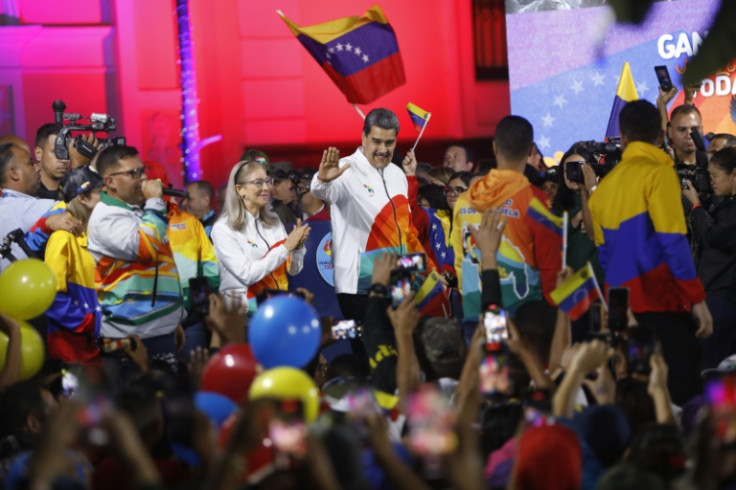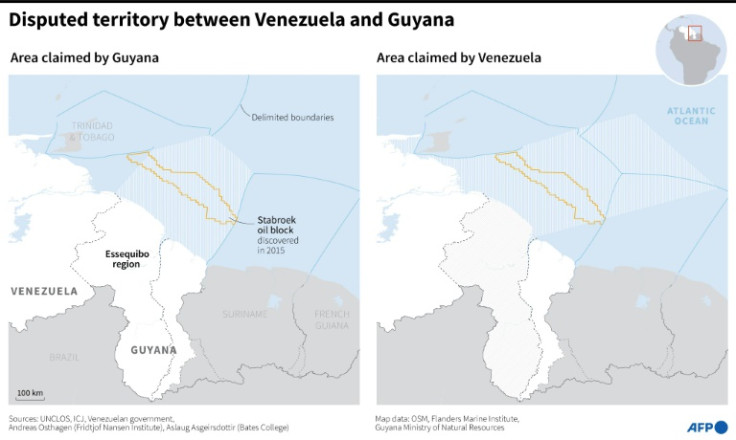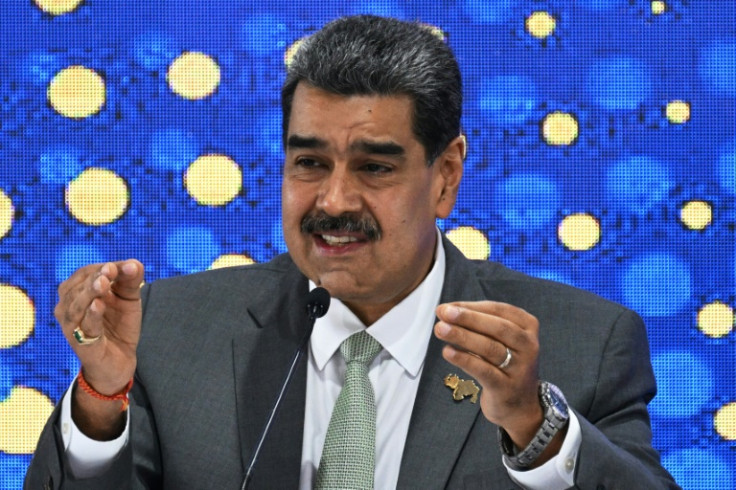Guyana 'Vigilant' As Venezuela Vows To 'Reclaim' Disputed Region

Venezuela vowed Monday to "reclaim" what it considers its right to a disputed oil-rich region bordering Guyana, which said it would remain "vigilant" although it did not expect an imminent invasion.
President Nicolas Maduro on Monday said he had popular backing for laying claim to the region known as Essequibo following an overwhelming "yes" vote in a controversial referendum.
The outcome, he said, was a "powerful, vital boost," to Venezuela's claim to a region which Guyana has administered for over a century and makes up more than two-thirds of its territory.
"Now we are going to reclaim the historic rights of Venezuela in the Esequiba Guiana (as it is called in Venezuela), now we are going to do justice," Maduro said at a press conference in Caracas with members of the National Electoral Council (CNE).
Guyana, for its part, said it would remain "vigilant."
"We have to always remain vigilant. Of course, our monitoring must be always at a high level. President Maduro, while we don't believe he will order an invasion... can do something that can be very unpredictable," Foreign Minister Hugh Todd told AFP.
Caracas said more than half of eligible Venezuelan voters had taken part in the referendum that yielded an overwhelming "yes" outcome, with more than 95 percent in favor.
Venezuela has for decades laid claim to Essequibo, which is home to 125,000 of Guyana's 800,000 citizens.
Litigation is pending before the International Court of Justice (ICJ) in The Hague over where the borders should lie.
Guyana, a former British and Dutch colony, insists the frontiers were determined by an arbitration panel in 1899.
But Venezuela -- which does not recognize the ICJ's jurisdiction in the matter -- claims the Essequibo River to the region's east forms a natural border and had historically been recognized as such.
The dispute has intensified since ExxonMobil discovered oil in Essequibo in 2015.
Caracas called Sunday's referendum after Georgetown started auctioning off oil blocks in Essequibo in August.
Voters were asked to respond to five questions in the referendum, including whether Venezuela should reject the 1899 arbitration decision as well as the ICJ's jurisdiction.
They were also asked whether Venezuelan citizenship should be granted to the people -- currently Guyanese -- of a new "Guyana Esequiba State."
There was a massive campaign for Venezuelans to vote "yes," but none against the measure which Guyana says posed an "existential" threat to itself.
More than 10.4 million out of 20.7 million eligible voters cast their ballots, CNE president Elvis Amoroso said Monday, seeking to lay to rest initial doubts about the turnout.
The initial tally had been met with suspicion by opposition politicians and analysts, who said it appeared voters' responses to each of five questions on the referendum may have been counted as separate ballots cast.
The figure of 10.4 million announced Monday by Amoroso is the highest turnout ever in a Venezuelan election.
The referendum raised fears in Guyana, and further afield, about Venezuela's intentions for the contested territory.
Todd told AFP Guyana would maintain defense cooperation with the United States and other strategic partners and continue diplomatic efforts to persuade Venezuela to let the ICJ make the final determination.
"We have already made it clear that we will abide by the ruling of the court," he said.
Brazil, which borders both nations, said Monday it had made high-level contacts with authorities in both countries to seek a resolution.
The US State Department through spokesman Matthew Miller called for a peaceful resolution.
"This is not something that will be settled by referendum," he said.
Guyana had asked the ICJ to block Sunday's vote.
On Friday, the court urged Caracas to take no action that might affect the disputed territory, but did not grant Georgetown's request for urgent intervention.
Experts consulted by AFP said the referendum had no legal standing.
"The referendum does not impact the process before the court," said Mariano de Alba, senior advisor for the International Crisis Group.
"Such consultations are not binding legal sources in public international law," added Guillermo Tell Aveledo, professor of political studies at the Metropolitan University in Caracas.


© Copyright AFP 2025. All rights reserved.





















